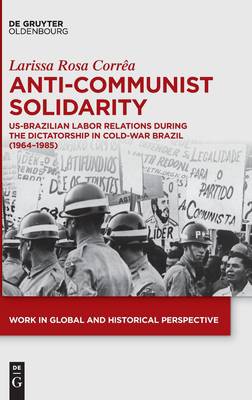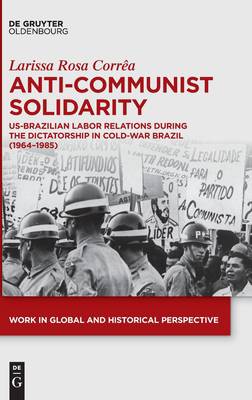
- Afhalen na 1 uur in een winkel met voorraad
- Gratis thuislevering in België vanaf € 30
- Ruim aanbod met 7 miljoen producten
- Afhalen na 1 uur in een winkel met voorraad
- Gratis thuislevering in België vanaf € 30
- Ruim aanbod met 7 miljoen producten
Zoeken
Anti-Communist Solidarity
Us-Brazilian Labor Relations During the Dictatorship in Cold-War Brazil (1964-1985)
Larissa Rosa Corrêa
€ 193,45
+ 386 punten
Omschrijving
Since the 1960s, many influential Latin Americans, such as the leaders of student movements and unions, and political authorities, participated in exchange programs with the United States to learn about the American way of life. In Brazil, during the international context of the Cold War, when Brazil was governed by a military dictatorship ruled by generals who alternated in power, hundreds of union members were sent to the United States to take union education courses. Did they come back "Americanized" and able to introduce American trade unionism in Brazil? That is the question this book seeks to answer. It is a subject that is as yet little explored in the history of Latin American labor and international relations: the influence of foreign union organizations on national union politics and movements. Despite the US's investment in advertising, courses, films and trips offered to Brazilian union members, most of them were not convinced by the American ideas on how to organize an "authentic" union movement - or, at least, not committed to applying what they learned in the States.
Specificaties
Betrokkenen
- Auteur(s):
- Uitgeverij:
Inhoud
- Aantal bladzijden:
- 271
- Taal:
- Engels
- Reeks:
- Reeksnummer:
- nr. 12
Eigenschappen
- Productcode (EAN):
- 9783110737745
- Verschijningsdatum:
- 20/12/2021
- Uitvoering:
- Hardcover
- Formaat:
- Genaaid
- Afmetingen:
- 156 mm x 234 mm
- Gewicht:
- 576 g

Alleen bij Standaard Boekhandel
+ 386 punten op je klantenkaart van Standaard Boekhandel
Beoordelingen
We publiceren alleen reviews die voldoen aan de voorwaarden voor reviews. Bekijk onze voorwaarden voor reviews.








